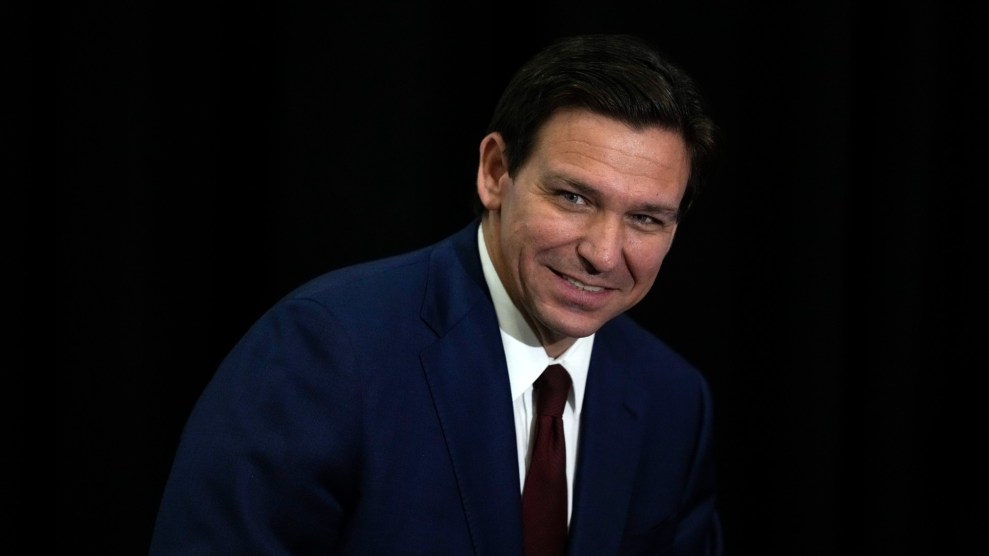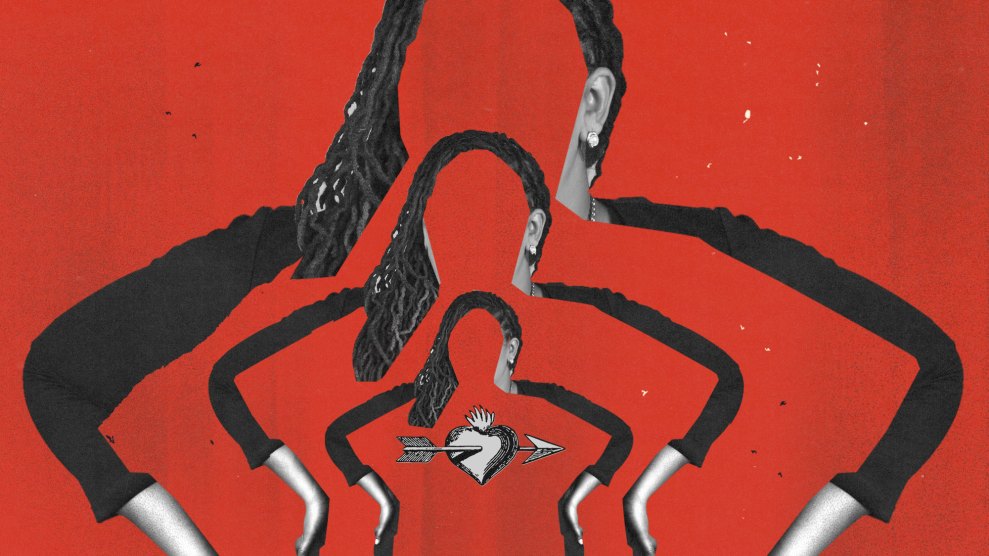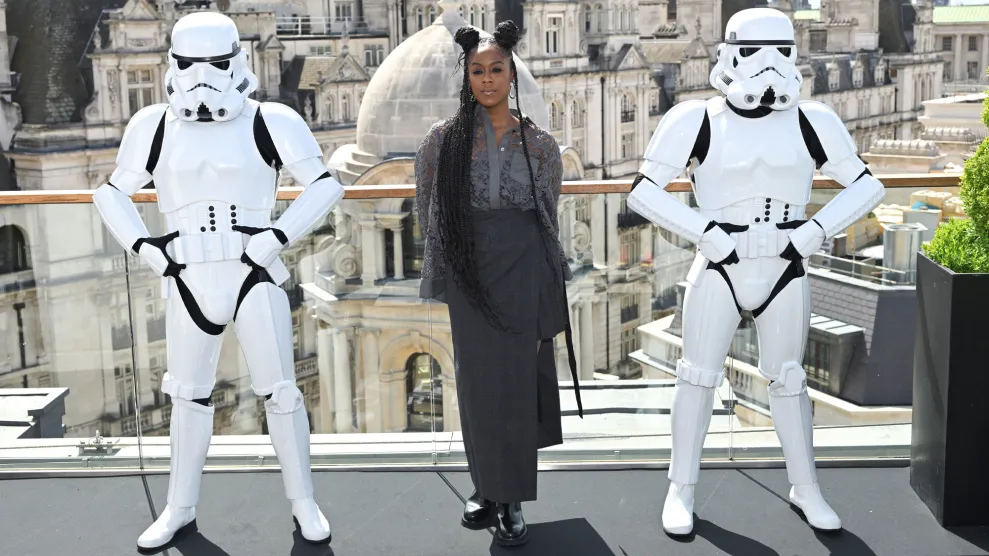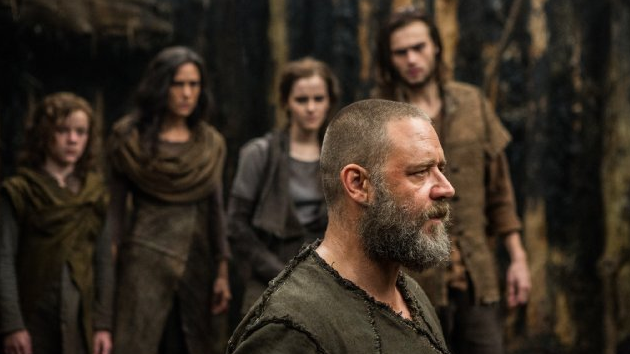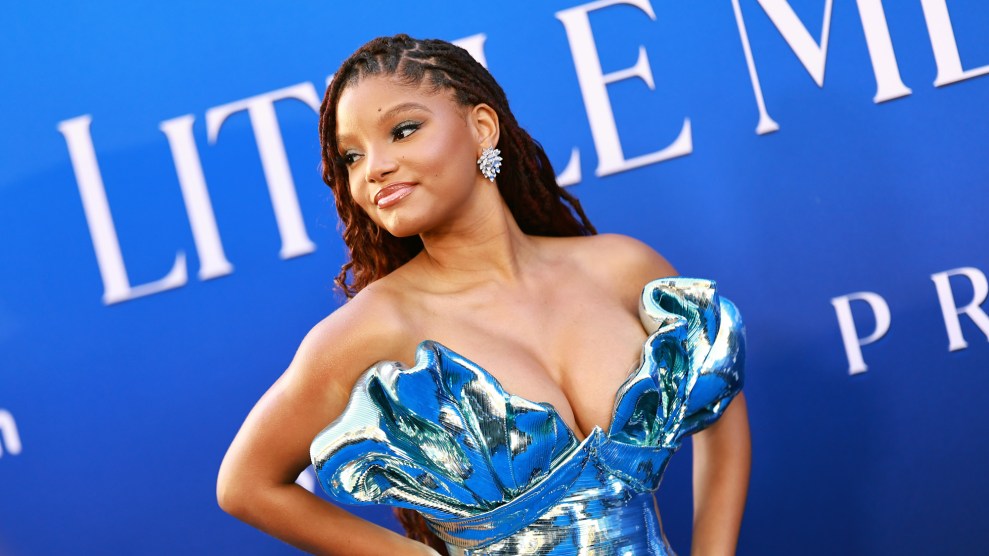
Halle Bailey at the premiere of The Little MermaidMatt Winkelmeyer/Getty
When Disney announced that the singer and actress Halle Bailey was chosen to play Ariel in the upcoming live-action adaptation of The Little Mermaid, I was uncharacteristically ecstatic. With her angelic voice and magnetic onscreen presence, even I, as a vocal Disney live-action hater, had to admit that Bailey as Ariel was a match made in heaven. As one half of the four-time Grammy-nominated duo, Chloe x Halle, she seemed the perfect choice to play a character whose voice is paramount to the story. Plus, as a Black woman, I was thrilled that young Black girls will have one more Disney princess to dream about.
But not everyone shared my sentiments. The announcement kicked off a predictable parade of racist furor. Right-wing commentators, including Matt Walsh, tried to “scientifically” explain why a mermaid, a fictional sea creature, couldn’t be Black. Others denounced the casting decision as “woke pandering” from Disney. Racist illustrations depicting Bailey with fried chickens circulated—one Twitter user even edited the film’s trailer footage to make Bailey appear white.
We’ve also seen such responses with Star Wars, Harry Potter, and countless Marvel films. Whenever an actor of color plays a character widely viewed as white, some fans go totally berserk. But why?
Why can we imagine a world of singing fish, but not a Black mermaid? pic.twitter.com/ciVOdIJlMT
— Mother Jones (@MotherJones) May 26, 2023
My colleague Sam Van Pykeren and I talked to Ebony Elizabeth Thomas, the award-winning author of The Dark Fantastic: Race and the Imagination from Harry Potter to the Hunger Games, to unpack the racism lurking in fantastical spaces and how the culture can resist racist gatekeeping.
How did you get into dissecting nerd stuff as a career?
I call myself a professional fangirl. I could say that some of it is from my academic training. But so much of what I observed began when I was a child in 1980s Detroit desperately searching and longing for magic and science fiction. I kept looking for myself, between the pages and on screens. Unfortunately, magic didn’t seem to take much notice of me: I was a little Black girl in Reagan-era Detroit.
What was your reaction to Halle Bailey’s casting?
I was overjoyed. I was thrilled. I got to watch all the reactions of the little Black girls seeing Halle play Ariel. It was just so wonderful to vicariously see them react to her being at the very center of the narrative.
Oh my goodness, seeing those little girls’ faces light up took me back to being a kid and seeing Princess Tiana for the first time. How has that representation evolved since you were a girl?
We were present and in those stories by the ’80s, but we were generally relegated to the friend on the side. This generation is going to be able to see themselves at the center of a story—and it’s Disney! A critique of Disney is that it’s all about happily ever afters—but this idea of a young Black woman playing a mermaid when the stereotype is that we can’t swim? Halle Bailey is showing us we belong in the sea.
Yes, we can imagine talking animals, handsome princes in seaside castles, and even half-fish people, but people still have a hard time with her being Black.
Most English language children’s literature for many, many years has been majority white. If you are not reading West African and Caribbean folktales, then you’re not aware of other mermaid traditions. There are mermaid traditions from folklore from all over the world, but we only ever got to read or view stories based on Hans Christian Anderson’s The Little Mermaid. It’s like wait, a Black girl can’t be Ariel in The Little Mermaid? And it’s because we have a prescribed place in the collective imagination. So not only do you have a Black character—or a character of color, or an LGBTQ character—as the hero or the protagonist; on top of that, you have something that does not happen in the real world. And readers and viewers can’t take that. It’s too much.
A lot of people try to depict the Little Mermaid—and mermaids in general—as straight, white stories. But that might not match the creators’ intentions, right?
There is speculation that Hans Christian Andersen was gay. And that The Little Mermaid was really a story about the fact that he was living during a time when you could not be openly gay at all. And so encoded in The Little Mermaid is not a cis-heteronormative story. It also is a story about what it meant to live as a gay man in previous decades and centuries. Again, none of that was provided to us as kids, because the script our culture needed us to believe in is that boys could never show fear, or sadness, or emotion.
And here’s a mermaid who does those things very openly.
I’ve seen younger girls say we want soft Black girls. And you see that with Ariel in The Little Mermaid, she is innocent. She’s also trying to navigate beyond the romance, which is the hallmark of so much of Disney. But beyond that, it’s about going into a new environment.
That innocence is so important, especially for young Black children to see.
Having Halle truly subverts our traditional notions of innocence. Often, Black children are not seen as innocent. And we have seen that play out in disaster over and over again through the videos of Black death—either at the hands of the state or the hands of a misguided neighbor.
And it really is because there’s a centuries-old history of not seeing Black children as children, because you’re not supposed to enslave children, you’re not supposed to jail them, and you certainly should not execute them. Our children are not seen as children because of this. And it is a powerful thing to see [a person] you have been carefully taught not to see as a child—or not quite as human as your kids or as yourself—play this character at the middle of the story; the main character and the love interest.
Ariel’s innocence is very important because so often Black girls are seen as sneaky or sassy or criminal—or someone to be disregarded. This story does not allow you to do that: She’s going to be singing “Part of Your World” and “Kiss the Girl.” We’re going to hear all of the classic songs be associated with a young Black woman with dreadlocks or natural hair. And that is powerful, especially given narratives around Black people swimming and other natural spaces.
How does that change things?
If we can mentor each generation to read and view and enjoy stories—rich stories—about themselves and each other, I believe we can have a much better future. And there are people out there in this society who see that and want to do anything in their power to stop that from happening.
From book bans in school libraries to discriminatory curriculum restrictions in education, it’s happening across the country!
It’s not about corruption, which is what a lot of people on the right think—that the child is a blank slate that needs to remain unsullied. It really is the case that you are looking for cues about what the world outside your family and immediate environment might be like. The purpose is not so that all of a sudden you’re like, “Oh, wow! I’ll see this and become someone that I wasn’t meant to be!” It’s quite the opposite. You’re reaffirming you. You exist even without the story, but the story does something to just make your head lift up a little bit higher.
And books are a powerful way to socialize kids. I didn’t say indoctrinate kids, because that is what some people think, but to socialize kids. Just because a kid watches the luminous Halle Bailey as The Little Mermaid or reads Julián Is A Mermaid does not mean that they are suddenly going to be a little Black girl or suddenly be gay or trans. That’s not how identity works. You cannot indoctrinate someone into being an identity that they are not.
But the fear that people feel when they see nontraditional casting or characters from marginalized groups in these stories—they feel unsettled. They’ve only known stories to work a particular way, outside of the odd outlier. You can be anything in a story today! What is the world coming to?
And some people have very strong reactions. We’ve seen massive review bombings before movies even come out, and viral social-media campaigns against them.
Audiences have a range of reactions to stories where characters of color, LGBTQ characters, and other characters from the margins are liberated. They tend to either ignore the story and not really give it an audience, complain that they are confused by it, or it’s not that interesting. It takes practice to relate to people who aren’t like you. And some of us have had practice doing so all our lives. Other people have not.
As your book notes, audiences seem to have a particular distaste for Black girls and Black women in these stories.
This is a huge problem. People will say, I just don’t like her or she’s not likable. The most extreme reaction that we see is a violent reaction where fans want to erase characters—we typically see that in speculative fandom: science fiction, fantasy, and comic fandoms. And while there is a general dislike in these fandoms for female characters, they really react to Black women and Black girl characters.
There’s also the argument that we should just create new characters for Black women and not recast old roles. Any thoughts on that?
Every culture has traditional stories, and in the United States, our modern culture’s traditional stories are Disney, Marvel, DC Comics, etc. It’s the critique of Shondaland and Bridgerton. People say, “Why do you want Black people in these historically white roles?” What you’re doing here is you’re moving audiences, so if they’re used to seeing a Black mermaid, then maybe they’ll go read another story. Or maybe there will be more adaptations.
Why is it important that we understand these stories as more than just an escape?
Fantasy tends to be some of the very first stories that we hear, in the guise of fairy tales, folklore, and fables. From our earliest childhood, we learn the shape and texture of fantasy stories. And really you can’t understand anything much about popular culture today without thinking about speculative fiction and fantastic stories, because they are the center of the culture. And this country was founded on a fantasy! The American Dream is a fantastic tale that does not tell us all of what happened. That’s the fairy tale. That’s fantasy you’ve acquired.
Stories really are what make us sapient, they make us wise. Because not only do they connect us to the past, but they also are portals into the future. And when you share a story with a young person, you get to share a story with someone who will still be alive in the 22nd century. This is how we get to build inclusive futures that we’ll never see. It’s how we imagine tomorrow into existence. That’s what the stakes are.
It’s easy to get lost amid the racist nonsense. How do we stay positive?
Just as we give people who are negative about The Little Mermaid lots of attention, I would urge us to also focus on the kids and the families who are super excited about the premiere. I’m truly excited about all that is to come.
This interview has been edited for length and clarity.


